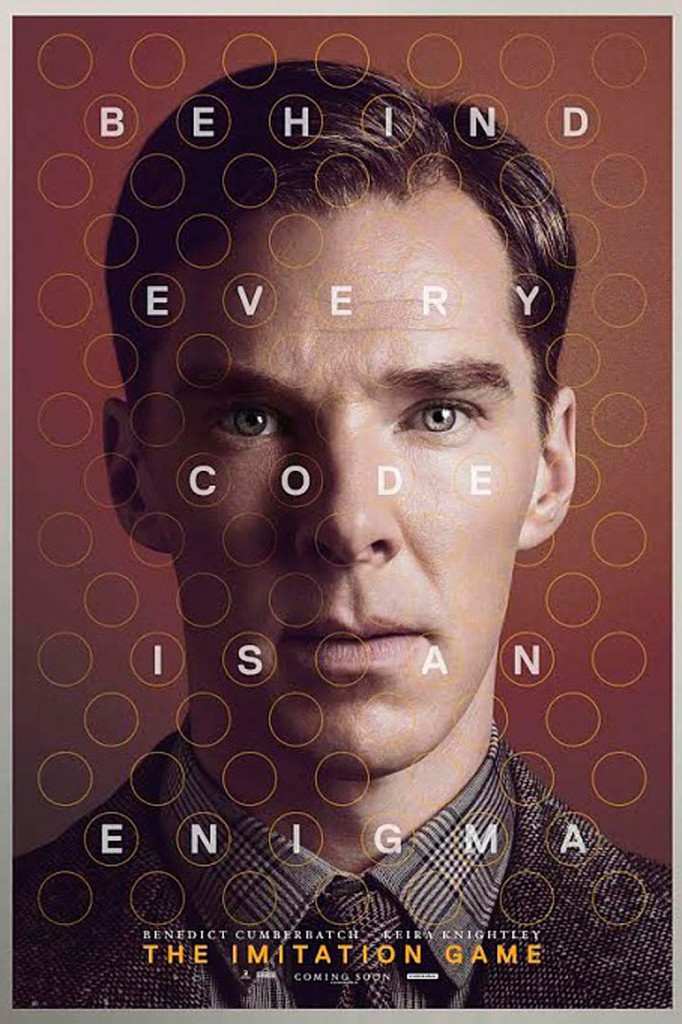 Is The Imitation Game a movie? The answer might surprise you.
Is The Imitation Game a movie? The answer might surprise you.
There I was, skimming through the comments last week, when I spotted one that caught my cornea. The comment was from a writer who had asked his director friend what he thought of the Black List. There were some good scripts on there, the director friend conceded, but not a lot of MOVIES.
Not a lot of “movies?” What was that supposed to mean? Aren’t all scripts written to be movies? What was this strange director friend of a friend of a commenter talking about?
What he was talking about is that not every good script makes a good movie. That’s because good movies aren’t only about stories. Movies are about imagery and ideas and action and adventure and sound. There was a time long ago when people went to the movies because they could take them places they’d never be able to visit otherwise.
It’s a lot easier to see the world these days with the internet and a thousand outbound flights to Europe every day. But the spirit of this statement is still true. A movie has to give people something they can’t have in real life, something outside of the norm.
Look at the Star Wars trailer, which, no, I have not watched 117 and a third times since Friday. Who gave you that information? There’s a sense of “action” in each of the shots presented. The characters need to get somewhere. We’re on other planets seeing things we’ve never seen before. We can’t get this kind of action or these kinds of worlds anywhere else but in the movie theater.
On the flip side, you have films like Garden State and The Skeleton Twins. These aren’t movies. They’re glorified 90 minute TV shows – talking heads going through issues. With the line between TV and film blurring more every day, it’s become even harder to justify these “movies.” They’re not giving us anything we can’t see on our television sets.
I’ll never forget what an agent told me when I first got here, which is that people are going to pay MILLIONS OF DOLLARS to produce your screenplay. So what are you going to show the world that’s worthy of those millions? If it’s just two people chatting about how life is difficult, your financers are going to wonder why you need 2 million bucks. Why not just shoot it on a Best Buy camera for nothing?
Let’s get more specific. What is it that makes a script a “movie script” and not simply a “good screenplay?” Here are seven things that will help you determine just that. Your script doesn’t have to hit all of these points. But it should hit most of them.
1) A large scope – Movies are supposed to feel larger than life. So the scope should feel bigger than normal.
2) The script falls within one of these movie-friendly genres: horror, sci-fi, action, adventure, thriller, period.
3) The script doesn’t fall within one of these non-movie-friendly genres: Straight drama, coming-of-age, political, romance (unless you’re Nicholas Sparks), and satire.
4) Your script is something we can’t get anywhere else but in the movies (dinosaur parks, for example).
5) Can you easily imagine the trailer?
6) Is the script something a director would be eager to direct? (I bet there wasn’t a line of directors out the door wanting to helm “Obvious Child.”)
7) There’s a lot more action (and by action I mean characters doing things, not just stunt action) than there is talking.
With this newfound knowledge, let’s look at five Black List loglines and determine if they’re “movie” ideas or just well-written screenplays. I want to make something clear. I am in no way passing judgment on the scripts themselves. In fact, I haven’t even read any of them. We’re just trying to determine the script’s viability as a movie.
Hot Summer Nights
Logline: A teenager’s life spirals out of control when he befriends the town’s rebel, falls in love, and gets entangled in selling drugs over one summer in Cape Cod.
It sounds like the main character is quite active in this, which is good. The drug trouble stuff implies some moving around (movement is good – it’s not called a “move” “ie” for nothing). But the scope here feels too small. I don’t see any directors getting excited over this. They made the similar “Toy’s House,” last year, a script that I liked. And the film was pretty good too. But nobody saw it because it was, you guessed it, not really a movie. If you turned this into a straight comedy, a la Superbad, that’s a different story. Mainstream comedies are always movies. But this doesn’t sound like that.
I’m Proud of You
Logline: A journalist looking for a story about television’s role in the Columbine tragedy interviews TV’s Mr Rogers and, as a friendship develops between the two, he finds himself confronting his own issues at home.
I mean put yourself in a director’s shoes. Is there anything at all in this logline that would make you want to direct this film? Any powerful imagery? Any action? Anything unique to do on the filmmaking end? My guess is no. This sounds like a very slow-moving sad character piece, which are anti-movies.
The Line
A corrupt border crossing agent must decide what is more important — saving his soul or inflating his bank account — when he discovers a young illegal boy who escaped a cartel hit on the border between the U.S. and Mexico.
I’m seeing the word “slow” in my head every time I read this logline. “Slow” and “movie” don’t go together. Movies must have a sense of urgency, of people needing to do things. Here, it sounds like a lot of sitting around, a lot of characters discussing their pasts, their feelings, their shitty situations. Since “slow” is usually synonymous with “boring,” this doesn’t feel like a movie to me.
Elsewhere
Logline: After his girlfriend dies in a car accident, a man finds his true soul mate, only to wake from a coma to learn his perfect life was just a dream — one he is determined to make real.
My first thoughts are that this isn’t a movie. Seems more like indie actor bait. With that said, the premise is cleverer than the others, and it leaves the viewer with a compelling question (Does he find his soul mate?) that may entice them to see the film. But getting people to the theater doesn’t necessarily mean you’ve created a movie. If the shots are still static. If the style is still basic. If there’s not a lot of movement or urgency, then fancy premise or not, you still don’t have a movie.
Diablo Run
Logline: While on a road trip to Mexico, two best friends are forced to enter a thousand-mile death race with no rules.
Boom! Finally, we have a movie! Look at the elements involved. A dangerous country. Good! “Forced.” That means characters must do things against their will (conflict!). “Race.” That means cars and lots of action. “Death.” That means the stakes will be high, with competitors wanting to kill one another. Go ahead, imagine the trailer. It’s way clearer than any of the above ideas, right? That’s a good sign that you’ve written a movie.
 The Force Awakens: Definitely a movie!
The Force Awakens: Definitely a movie!
Now this isn’t always a clear cut thing. Some scripts are stuck between these two extremes. We don’t know if they’re movies until we see them on the big screen. After the studios grab all the best material (the material that results in the best movies), this “unclear” material is out there for the pickins and second-tier producers have to gamble on each horse, hoping they’re a movie.
The Imitation Game script is a perfect example. It was about World War 2, but the majority of the scenes took place in small rooms with characters talking to each other (dreaded “talking heads”). Again, people talking in rooms is about as exciting as watching fish bake. Any schmoe can buy a camera and record people in rooms. There’s no action. There’s no vision. It’s static. Audiences don’t like to pay for these films because they don’t see anything movie-like about them.
Now I still haven’t seen The Imitation Game, but I’m guessing one of the first things they did when they rewrote it was to look for ways to make it more of a MOVIE. Can we show some of these WW2 ships attacking each other instead of hearing our characters talk about them? Can we put our characters ON these ships? Can we put them closer to the war so we can see more of the war? Can we put them in a bombed city? Can we add a scene where the bombing comes close and they must run for their lives? This is how you turn an “almost movie” script into a movie.
And look, I’m not saying that non-movie scripts can’t be good films. I loved The Skeleton Twins. I loved Philomena. I love Good Will Hunting. What I’m saying is that they’re infinitely tougher to sell because they’re not movies. They don’t have movie-like qualities. Take one of the greatest films ever – The Shawshank Redemption. That wasn’t a movie. It had some cinematic aspects to it. But it was guys talking in a prison. Now you might say, “Carson, now you’re just straight up trippin. Shawshank not a movie?? You’re off your rocker!” Okay, well then let me ask you this. Where were all of you when the movie came out? Cause you didn’t show up at the theater. The Shawshank Redemption bombed gloriously at the box office because people saw that trailer and went, “That’s not a movie. That’s a lot of sad people chatting in jail.”
The reality is, in this day and age, with TV getting bigger and theatrical releases favoring flashy more extravagant movies, there’s less and less room for these non-movie screenplays. So you have to think long and hard about what you want to spend the next six months on. You can write a “movie” and get a lot of interested parties when you’re finished. Or you can write a “script” and make things really hard on yourself.
If you think this advice is bullshit (I’m sure some of you do) and still prefer writing “scripts,” I’d strongly suggest making your script yourself. The one advantage with non-movie scripts is that they’re cheaper to shoot. It’s typically just a camera and actors. It’s actually a good thing no one will give you money because it’ll force you to go out and make it on your own. And who knows? If the characters are fascinating and the plotting’s great, it might end up being one of the few “non-movies” (i.e. American Beauty) that make some noise. But if I were you, I’d stick with movies. It’s so much easier to get your script noticed when you’ve written a movie. ☺

